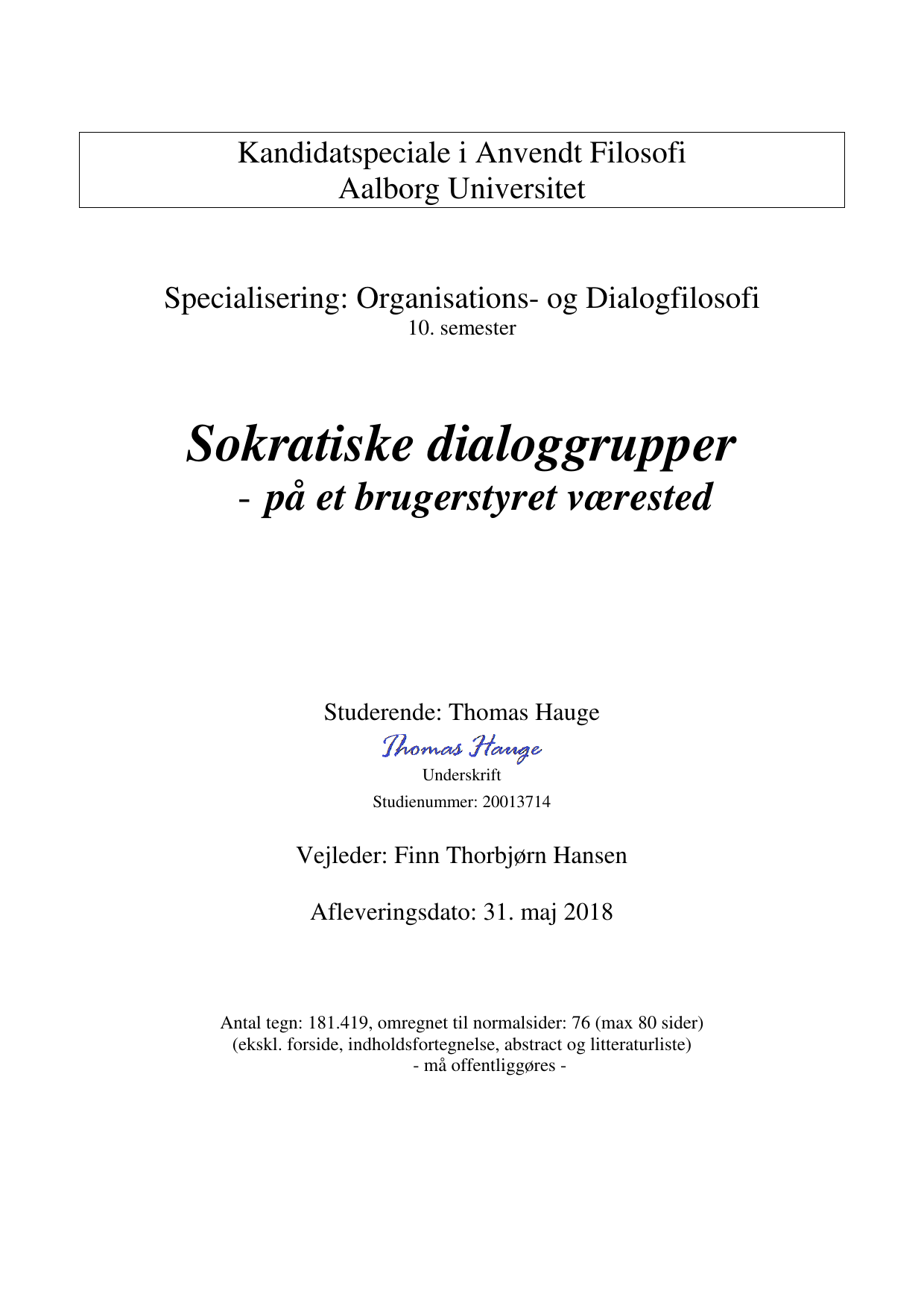
Sokratiske dialoggrupper på et brugerstyret værested
Oversat titel
Socratic Group Dialogue at a voluntary drop-in-center
Forfatter
Semester
4. semester
Uddannelse
Udgivelsesår
2018
Afleveret
2018-05-30
Antal sider
84
Abstract
Temaet for dette speciale er at undersøge mulighederne for at introducere filosofi overfor frivillige og brugere på et brugerstyret værested. Formålet med at bringe filosofien ind på dette felt er at forsøge at skabe en situation, hvor fælles filosofisk undersøgelse og undren er i fokus. Som en del af undersøgelsen fokuseres på mulighederne for at berige den pædagogiske praksis med inddragelse af filosofi, samt en analyse af, hvordan brugen af sokratiske spørgeformer i kognitiv metode adskiller sig fra den filosofiske forståelse af en sokratisk tilgang. Teoretisk tager specialet udgangspunkt i Hans-Georg Gadamers filosofiske hermeneutik, og elementer af Hannah Arendts filosofi, med særlig vægt på hendes begreber handling og tænkning. Specialet konkluderer, at sokratiske dialoggrupper kan tilbyde en ny og anderledes tilgang, som rummer muligheder for at udvikle pædagogisk praksis, og for at skabe rum for undren sammen med frivillige og brugere.
Title: Socratic Group Dialogue at a voluntary drop-in center The theme of this thesis is to examine the possibilities of introducing philosophy to voluntary helpers and socially vulnerable users at a voluntary drop-in center. The purpose of introducing philosophy to this group is to try and create an environment of common curious investigation of central life-topics that ideally will lead to a sense of wonder (thaumazein). The meaning of Socratic investigation in cognitive behavioral therapy is also scrutinized, in order to develop new approaches in social work. The method chosen for this investigation is The Socratic Group Dialogue as developed by the Danish professor Finn Thorbjørn Hansen. Helpers and users at the drop-in center were invited to participate in group dialogues, which were facilitated by the author of this thesis. The process and results of the dialogues are analyzed using phenomenological and hermeneutic philosophical theories. The two German philosophers Hans-Georg Gadamer and Hannah Arendt are the theoretical foundation of the analysis, which also presents the ancient, but still valid, thoughts by Socrates. Hans-Georg Gadamer is well known as the philosopher behind modern hermeneutics. In this thesis his thoughts on interpretation, understanding and meaning are unfolded, and the concepts of the matter itself is thoroughly discussed. He claims, in his masterpiece Truth and Method, that one cannot detach dialogue from life itself. Our approach towards the truth is limited by our own horizon of understanding. It is not possible for man to find the meaning behind things, but if we listen carefully and open ourselves towards life, meaning can find us. Hannah Arendt has developed many philosophically interesting concepts, and in this thesis some of them are presented. In The Human Condition Arendt writes about work, labour and action, and the distinction between plurality and duality. Plurality is the condition of human action because we are all the same, that is, human, in such a way that nobody is ever the same as anyone else who ever lived, lives, or will live. We are individuals with unique names, biographies, and talents that affect how each of us participates which means that I am not an effective substitute for you. Arendt stresses how thinking links the active life, and the contemplative minds. She considers thinking a human obligation, and describes thinking as a two-in-one dialogue, where the individual debates with oneself. Socrates contributes to the discussion on thoughts and wonder, and his method of dialogue is the basis of the Socratic Group Dialogue. Socrates persistently debated with people around him in a constant examination of life. His well-known motto was: The unexamined life is not worth living. The testing of The Socratic Group Dialogue in the drop-in center shows that philosophical conversations about the meaning of life can lead to wonder. The requirements for a wonderous dialogue on life topics are first and foremost an openness towards the meaning of the matter. To develop a dialogue, from the epistemological exchanging of doxa to an open-minded and ontological susceptibility to wonder, is not an easy task. As a facilitator of group dialogues one must simultaneously have two perspectives on the situation. One perspective is the framing of the dialogue and to ensure that the participants try to open up towards each other. The other perspective is to participate with one’s own thoughts and wonder. The result of the thesis is that the philosophical socratic dialogue can be conducted with a group of voluntary helpers and socially vulnerable users at a voluntary drop-in center. The philosophical understanding of Socratic questioning is different than the traditional understanding underlying cognitive behavioral therapy, and a new approach is considered useful in contemporary social work. The benefits of philosophical dialogue are numerous. When engaging in these peculiar conversations, people will move their perspective from a narrow minded view on individual problems to a wider perspective on common and universal human conditions. Participants would most likely experience a sense of acceptance and acknowledgement from the group. And finally, taking the words of Socrates in consideration, an examined life is worth living. It would be interesting to make further inquiries into the subject of ‘how to use philosophy in social work’. The findings suggest that philosophy can be a valuable supplement in the everyday contact between the social worker and the socially vulnerable citizens.
Emneord
Gadamer ; Arendt ; Sokrates ; Undren ; Dialoggrupper
